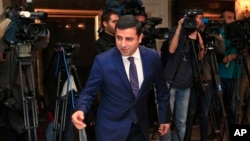The leader of Turkey’s main pro-Kurdish party is due to arrive in Moscow on Thursday amid a deepening diplomatic crisis between Moscow and Ankara.
The visit will fuel speculation about whether Moscow could be seeking to exploit Turkey's restive Kurdish minority.
Selahattin Demirtas, leader of the Peace and Democracy Party, will be hosted in Moscow by Russian Foreign Minister Sergei Lavrov. Demirtas has said his party intends to open an office in the Russian capital.
Murat Bilhan, vice chairman of Tasam, an Istanbul-based political think tank, said Demirtas' visit would most likely stoke fears that Russian support could extend beyond Turkey’s legal Kurdish movement to the PKK rebel group.
"With the PKK, they [Moscow] have a long-standing relationship, and maybe they can play with it like a Damocles sword," Bilhan said. "Russia never considered [the] PKK as a terrorist organization."
Turkish security forces are currently cracking down heavily on the PKK across Turkey’s predominantly Kurdish southeast and hitting PKK bases in neighboring Iraq, following July’s collapse of peace efforts.
But Atilla Yesilada, an Istanbul-based consultant with the Global Source Partners research group, said Moscow could also be courting the PYD, a Syrian Kurdish group that Ankara accuses of being linked to the PKK.
"Turkey’s policy of demonizing Kurds in Turkey and Syria could backfire seriously, and anyone in particular, [like] Iran and Russia, who wishes to do harm to Turkey is very certain to use PYD and PKK," Yesilada said. "So far, PYD has listened to American advice, but it could change sides anytime because Russia has started deliveries of weaponry to PYD."
Washington is supporting the PYD’s militia with airstrikes in the group's battle against Islamic State militants. Analysts say Moscow could back the PYD’s goal of seizing from Islamic State a section of the Syrian border that divides the Kurdish canton of Afrin from the rest of Syrian Kurdistan. Ankara has warned it would intervene to prevent this, given that such a move would place most of the Syrian border under Kurdish control and cut one of Turkey's last remaining supply routes to the Syrian rebels it supports.
Aydin Selcen, a retired diplomat who opened Turkey's first consulate in Irbil, the Iraqi Kurdish regional capital, believes the PYD would be reluctant to risk its relationship with Washington.
"PYD now has, maybe for first time, the U.S. as a real military ally there," Selcen said. "And there are now over 30 U.S. special forces members in the Jazira canton under control of PYD. I would not expect them to forsake that very valuable partnership with [the] U.S. for Russia."
Selcen said the threat of Russian machinations was another reason for Ankara to reopen a peace process with the PKK. However, Turkish President Recep Tayyip Erdogan has promised no letup in the war against the PKK, saying they will be annihilated in their homes.

